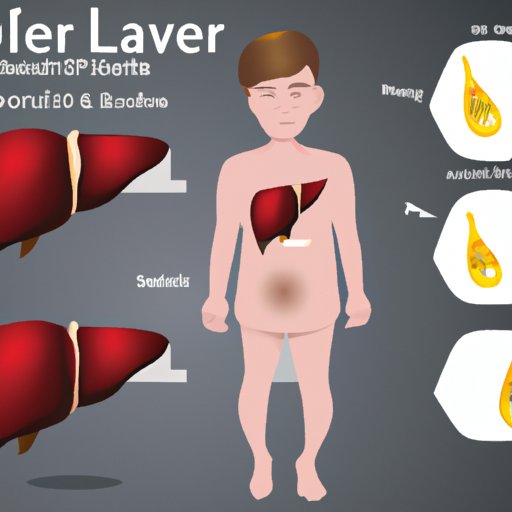
Introduction
Liver failure is a serious condition that can be difficult to detect. It is important to recognize the symptoms early so that treatment can be sought. In this article, we will explore the warning signs of liver failure and how you can identify them. We will also discuss the importance of early treatment and offer suggestions for maintaining liver health.
Understanding Liver Failure: Recognizing the Symptoms
Liver failure occurs when the liver is no longer able to function properly. This can happen due to a variety of factors, including alcohol abuse, viral infections, and certain medications. There are two types of liver failure: acute and chronic. Acute liver failure is a rapid onset of liver dysfunction, while chronic liver failure is a gradual deterioration of liver function. It is important to recognize the symptoms of liver failure quickly in order to seek treatment and prevent further damage to the liver.
The Warning Signs of Liver Failure You Need to Know About
The most common signs of liver failure include jaundice (yellowing of the skin and eyes), abdominal swelling and pain, fatigue, and confusion. The symptoms can vary depending on the type of liver failure. For example, someone with acute liver failure may experience nausea and vomiting, while someone with chronic liver failure may have an enlarged spleen or spider veins.
Imagine waking up one day and seeing that your eyes and skin are turning yellow. Or, you’re feeling unwell, having abdominal pain that is persisting over a few days, you may find that your appetite is waning and that you are feeling fatigued. These symptoms could be indicative of liver failure. However, pain in the abdomen and jaundice are not always present in liver failure cases, so you need to be aware of other potential symptoms.
Liver Failure: How to Identify the Symptoms and Seek Treatment
If you suspect that you may be experiencing symptoms of liver failure, you should see a doctor as soon as possible. Diagnosis typically involves blood tests to measure liver function, ultrasounds and other imaging tests to examine the liver and other organs, and liver biopsy. If diagnosed with liver failure, the treatment options may vary depending on the severity and type of liver failure. Treatments may include medication, lifestyle changes like altering your diet, surgical interventions, or even liver transplant if necessary.
Good liver health can be maintained throughout your life by eating a well-balanced diet and limiting alcohol intake. Early treatment is key and can make a significant difference in outcomes.
Signs Your Liver May Be Failing: Learn What Symptoms to Look For
In addition to the aforementioned symptoms, pale or bloody stools, dark urine, unexplained weight loss, itchy skin, and chronic fatigue can all be signs of liver failure. Individuals with existing liver conditions, those undergoing chemotherapy, and individuals taking certain medications are at higher risk of developing liver failure.
Liver failure can also be related to other conditions like autoimmune hepatitis, cancer and hepatitis B or C. Individuals diagnosed with these conditions need to be mindful about managing their liver health so as to prevent the development of liver failure.
The Silent Threat: Identifying Liver Failure Symptoms Before It’s Too Late
Advanced liver failure can be difficult to diagnose and is a serious threat to an individual’s health. In some cases, individuals may not experience any symptoms until the liver has already sustained significant damage. One proactive step you can take to protect your liver is to have regular checkups with your doctor: you should discuss your concerns about liver health and ask that liver function test be conducted as your lifestyle can impact the liver function. Losing weight, exercising, reducing alcohol intake and eating a well-balanced diet can all help reduce the risk of liver failure.
Conclusion
Liver failure is a serious condition that can be life-threatening, but early detection and treatment can make a significant difference in outcomes. Be aware of the symptoms, and seek medical attention if you believe you may be experiencing liver failure. Remember, good liver health is key to overall health and wellbeing.
For more information on liver failure, speak with your doctor or consult reliable resources such as the National Institute of Diabetes and Digestive and Kidney Diseases or American Liver Foundation. Specialists such as hepatologists and gastroenterologists can also provide critical insights.





